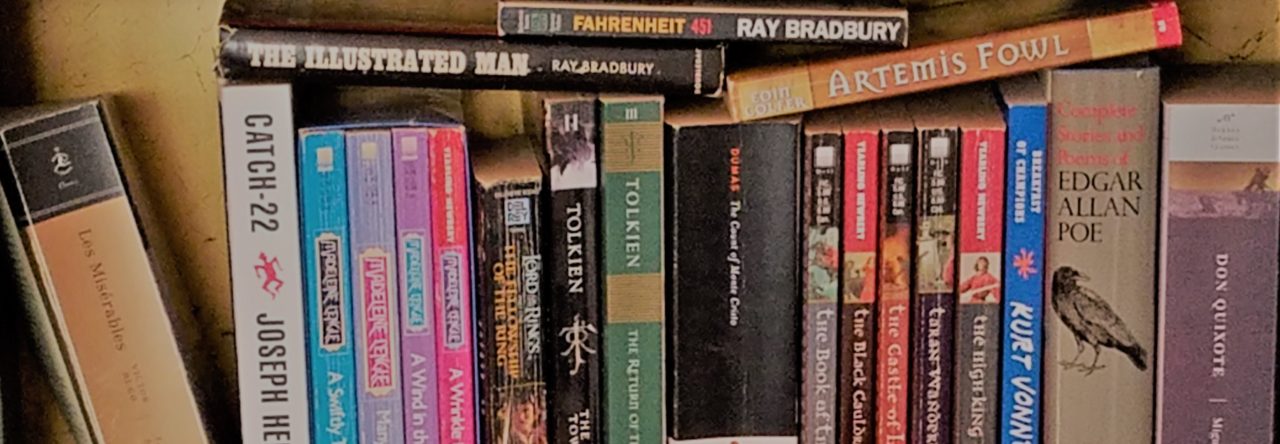Keywords: Audiobooks, ebooks, learning styles
I have a friend who almost exclusively reads audiobooks. Another listens to them while driving. Plenty of people love audiobooks. I don’t get it. They have never held the same appeal for me. Print has always seemed better: easy to find, and tangible. Plus, old books have that distinctive smell (yes, I’m that weirdo).
Though never drawn to audiobooks, I decided to try one a few years ago. I found a good deal on Brandon Sanderson’s The Way of Kings. “Reading” it in audio format was a train wreck. I couldn’t keep track of the plot or the characters. Dalinar? Gavilar? Elhokar? The names rhymed and each time they came up, it took me a second to remember how they were related. The voice actor reading the book sounded about Dalinar’s age. Every time he read a line of dialogue, I associated it with Dalinar even if another character was speaking. The complex structure of the book, with its prologues, interludes, and mysterious chapter-opening statements confused me because I couldn’t see how it was organized.
Reading it in print was like reading a different book. Without the confusion I experienced in its audio format, I could enjoy the story. It was a great read that I almost didn’t know about because of my inability to access it in audio format.
Later I tried The Martian by Andy Weir. That audiobook, I understood. Granted, it’s mostly a one character book, has a minimal subplot, and describes what the main character does in a methodical and scientific way. It was a much easier audiobook for me to follow.
Why do some people enjoy audiobooks, while others (like myself) struggle with the format? To help explain this, I did some research into styles of learning. Educators have identified three styles: visual, auditory, and kinesthetic/tactile.
- Visual learners love charts and graphics, and are good spellers. They prefer quiet study time, like colors, and are interested in visual pursuits such as art and fashion. They are bad with names.
- Auditory learners enjoy reading out loud and participating in discussions to learn. They also like music and pay attention to sound effects in movies. They like study groups and tend to be good with names, but bad with faces.
- Kinesthetic learners like to act out what they are learning. They want to get up and move, take breaks when studying, and like physical activities. They aren’t the best at spelling.
My first thought was that I struggle with audiobooks because I’m not an auditory learner. I remember information best by writing it down or reading it, and I’m bad with names but great with faces. But, I have fantastic recall for music and sound. If I’ve heard a studio recording of a song a few times, then hear a live version, I notice each tiny difference between the two. When movies and TV shows re-use musical cues and sound effects, it’s obvious and I often remember where the sound came from. Maybe I’m bad with names and so-so with verbal instructions, but the sound and cadence of someone’s voice sticks in my memory.
One’s preferred learning style can vary by subject. Students can also have a mixed learning style. I believe my style is a mix of visual and auditory, with a dash of kinesthetic thrown in for good measure. When reading, I visualize the scene, and hear the dialogue in my head, complete with pauses, tone, and inflection. Perhaps that contributed to my struggle with the audiobook version of The Way of Kings. I was unable to “hear” the dialogue the way I wanted. Contrast The Way of Kings with The Martian, which has less dialogue.
Maybe audiobooks work best for people with a strong auditory learning preference, who display some of the classic traits of auditory learners like remembering names and understanding verbal information well. The music/sound components of auditory learning (that would logically include remembering tone of voice and cadence) seem like it shouldn’t matter to enjoying an audiobook. Maybe there are two distinct kinds of auditory learners: those who have more verbal facility, and those who have more musical/sound facility.
And then there are… the dreaded ebooks. Duh-duh-DUH! Just kidding, I don’t hate ebooks. They make books cheaper and more accessible to more people, which is a good thing. I still prefer print for reading. Here’s where my slight kinesthetic learning preference comes in. Flipping pages and having a physical object to hold onto helps me engage with a book, and I’m more aware of its structure. I can engage with an ebook, it just takes slightly more effort. So, reviewing pdf copies of books is fine, but my library is mostly print. Ebooks may be a great, lower cost option for visual learners who won’t miss the absence of tactile sensation.
Just as we don’t have to study the same way, we don’t have to all read the same way. It’s great that there are several different options for reading out there, whether or not our preferences depend on our learning styles.
If you’re curious about your own learning style, try taking this quiz.

Leave a Reply